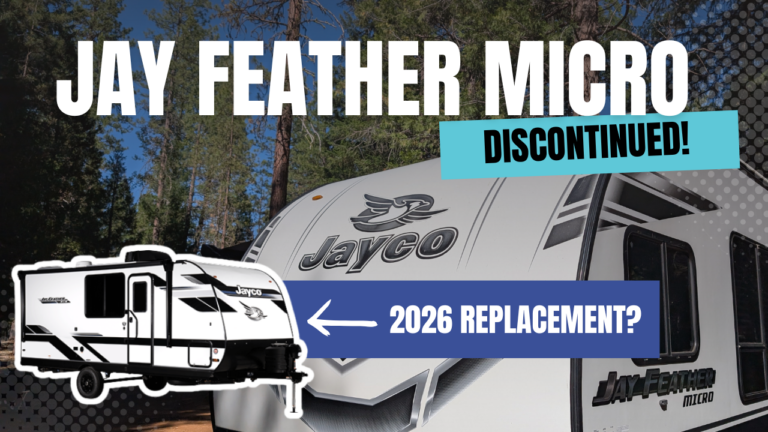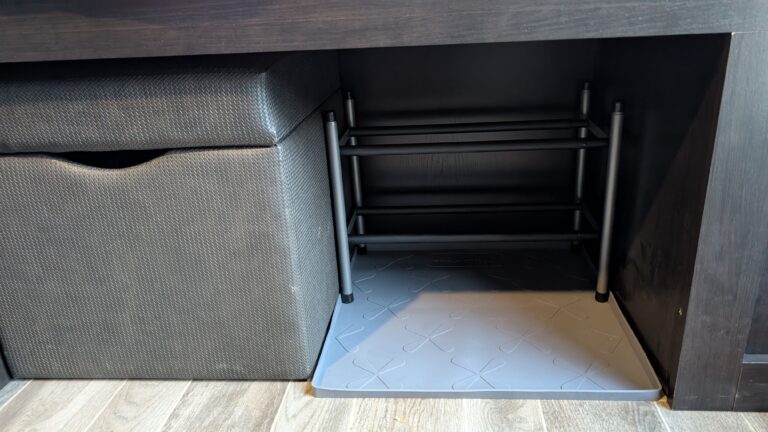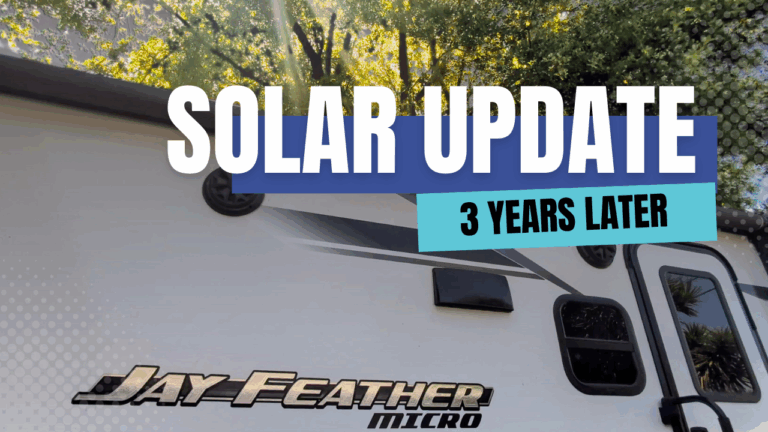We don’t winterize our trailer because we live in California. Where we live it doesn’t freeze. We don’t get snow, we don’t get freezing cold temperatures, and so we haven’t felt the need to winterize our trailer. On top of that because we don’t have really crazy winters, we use our trailer almost year round. There is normally a chunk of time between six to eight weeks that we don’t use the trailer, but that’s really more of a result of the craziness of the holidays and having a busy schedule than it is having weather that we can’t go camping in.
The last several years, we’ve had camping trips towards the end of November, and then we start camping again in February. This year we actually camped in December, which was really fun. We had kind of like a Christmas camping trip.
So we don’t winterize our trailer because it just doesn’t get that cold here and because we’re using the trailer all the time. But, that doesn’t mean that we ignore the fact that it is winter and it is colder. There are things that we do to prep our trailer to help get it ready for a harsh winter. So if there is an extra cold night or if we get a lot of rain, there are things we do this time of year to help prepare our trailer. So even though it isn’t your standard winterization, here are the things we do in the winter to help prepare our trailer.
Rogina Roaming is supported by its audience. When you purchase through links on our site, we may earn an affiliate commission at no extra cost to you.
Check Seals
The first thing is to check our seals. We find that after our last camping trip of the year, normally that’s around November, we like to check our seals and make sure there are no cracks or anything that needs to be patched up before we start getting some rain. That normally involves going on the roof and inspecting the existing seals and using a little bit of Dicor sealant over anywhere that has a crack.
Check Anode Rod
The next thing we like to do is check the anode rod in the hot water heater. Now if you have a tankless hot water heater, then you don’t have to do this, but our hot water heater actually has a little rod that you take out and you check. You want to check it on an annual basis, but we find that we don’t always have to replace it every year.
You just want to see how much is left and then put in a new one if it’s almost used up. The other nice thing about checking this in the winter is it does release a bunch of water from your hot water tank so you have less water sitting there in the trailer.
Remove Food
The next thing is I remove a bunch of food from the pantry. I go through and I remove anything that’s going to be expiring in the next couple months. So not only do I want to do a refresh of the food in the trailer, but I also want to make sure I take out anything that might attract ants or rodents. So I just find this is a great time of year to go through and check all the food that you keep in the trailer and just make sure that it’s stuff that you still want to keep out there.
Empty Fresh Water
The next thing that we do is empty our fresh water tank, so we don’t go through the traditional method of winterizing the trailer and cleaning out all the water lines and making sure everything’s out of there and adding antifreeze. This is the third winter that we’ve been doing it this way and we haven’t had any problems with it yet, but we do like to make sure there isn’t extra water just sitting in the trailer. So we make sure to go through and drain our fresh water tank.
Dehumidifier
Another thing we like to do is keep a dehumidifier in the trailer. So we normally have this out when we’re parked at home, but in the winter we really want to make sure it’s sitting out. So if there’s any extra moisture in the trailer, the dehumidifier will just help absorb some of that.
Routine Monitoring
Then the next thing that we do is we monitor the batteries. So we don’t just leave our trailer out here and then never check on it until we’re ready to go camping in the spring, we normally are checking on the batteries every week or so. So we want to make sure that the batteries get back up to a hundred percent about two times a month. So if we find our batteries are struggling to keep a charge, we might plug the trailer in.
We also take a look at the temperature. If it seems like it’s getting too cold, if we’re worried about a freeze happening, we can turn the heater on to help try and keep the trailer heated up.
So we are in and out of the trailer and we are monitoring it the whole time that we have it home and just parked in the driveway for the winter. So it’s not a set it and forget it situation. It’s more we’re still in the trailer. We’re keeping an eye on it, and so we don’t feel the need to completely winterize it because we’re not packing it away.
Conclusion
So that is what we do, and this is now the third winter we’ve been doing this, and we haven’t had any issues with it yet.
Now, I wouldn’t say that I’m recommending that this is what you should do. You are going to have to make a decision based on your situation. So of course, a lot of this has to do with the weather of where we live and the fact that it just doesn’t get that cold here. We don’t have snow, we don’t have freezing cold nights. So this gives us a little bit more flexibility with what we need to do with our trailer in the winter.
And we also are fortunate enough that we have our trailer in the driveway, so we’re still checking on it. We’re in here all the time. It’s not at a storage area where we have to kind of tuck it away and not see it for a couple months.
So I know this isn’t the normal way that you would prepare a trailer for the winter. So I just thought I’d share our methods since it is a little bit different, but seems to be working for us.



